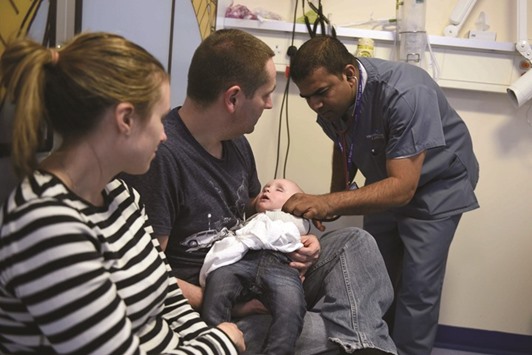Family doctors and medical leaders have rejected Theresa May’s demand to move to a seven-day week, with one prominent GP warning that it could lead to mass resignations.
Dr Kailash Chand, a former deputy chair of the British Medical Association, said GPs were so angry with government attempts to scapegoat them for the crisis in the NHS and chronic underfunding that they could disaffiliate from the service.
Downing Street has told surgeries in England that if they refused to move to 8am-8pm opening, seven days a week, they would lose funding unless they could prove there was no demand from patients.
Chand said: “I think making this particular statement at this minute is essentially scapegoating. (May) has got to find something, she can’t blame (health secretary) Jeremy Hunt for this, or her own government.
“She’s got to find a scapegoat and GPs are probably the easiest scapegoat in this way because your rival papers, like the Daily Mail, all the time are giving the public the view that GPs don’t work and GPs are working only nine-to-five, which is nonsense.”
Chand said he saw a more sinister, veiled motivation behind the threat, which was to “decimate or underfund the NHS to that level where people start saying the NHS is not serving and ultimately pass it on to the private sector”.
He added: “There was, last year, a special LSE conference in London in which there was a call for a mass resignation from GPs. The GPs I’ve talked to, they are so angry, so angry. And rightly angry, that what do they expect from us? And I think it’s high time, they might be that desperate, that they say yes. If you want this kind of work without funding then it is a call for mass resignation.”
David Wrigley, the current deputy chair of the BMA, said May’s call was essentially asking his colleagues to take irresponsible risks with their patients’ lives.
“The prime minister is actually asking doctors to provide unsafe care to their patients, which goes against everything a doctor has been trained for,” said Wrigley, who works as a GP in Lancashire.”
GPs work 12-14 hours a day in an NHS collapsing around them due to the defunding of the NHS by this government and cuts to social care brought about by Mrs May and her cabinet.
“Shamefully for this government, our NHS is one of the lowest funded health services compared with other European countries. We are short of thousands of GPs in this country.”
He added: “Of course the collapsing NHS suits the Conservatives, as we will see the introduction of private GPs, charging for appointments and insurance-driven healthcare. This nightmare scenario is not far away now.
“We will also see more services sold off to ministers’ friends in the large corporate sector.”
Nigel Edwards, the chief executive of the Nuffield Trust charity, suggested May’s call misinterpreted the nature of the crisis in hospital emergency rooms.
“The issue in A&E is largely around people with serious health problems who need a bed, and couldn’t be taken care of safely in general practice,” he said.
“The underlying problems are in social care and flow through hospitals.
“GPs have been under real pressure for some years, and spreading them more thinly across the week won’t necessarily help.
“Evaluations show that uptake for weekend appointments is often not very high. The government needs to work with NHS professionals to find solutions that work.”
Dr Chaand Nagpaul, the BMA GP committee chair, said they were facing a “major alert”, with eight in 10 practices saying they were unable to provide safe care, and one in three reporting unfilled vacancies.
“We have got a very serious problem that we don’t have the capacity in general practice. The crisis in the NHS won’t be solved by scapegoating or deflecting blame on to GPs,” he told the BBC Radio 4 Today programme.
“All patients can see a GP 24 hours a day, 365 days a year. Patients can see a GP when they need to. What we cannot be providing is stretching a service where we are struggling — and we do manage in spite of the pressures — into a seven-day service.”
The row comes amid increasing exasperation among ministers that the unavailability of GP appointments is driving patients to seek treatment in hard-pressed hospital accident and emergency departments.
The director of acute care for NHS England, Prof Keith Willett, recently estimated that 30% of the patients attending A&E would be better cared for elsewhere in the system.
A Downing Street source said: “Most GPs do a fantastic job, and have their patients’ interests firmly at heart.
“However, it is increasingly clear that a large number of surgeries are not providing access that patients need — and that patients are suffering as a result because they are then forced to go to A&E to seek care.
“It’s also bad for hospitals, who then face additional pressure on their services.”
Ministers say they are providing an additional £528m a year for general practices by 2020-21 to ensure the target for providing seven-day opening is met by that date.
However they say they are concerned by a recent finding by the National Audit Office that 46% of GP surgeries were still closing at some point during “core” weekday working hours — with 18% closing before 3pm a least one day a week — despite three-quarters of them having received extra funding to provide extended cover.
They also suggest some surgeries are failing to advertise the availability of extended hours appointments and GPs will be warned that future additional cash will be contingent on them demonstrating they are offering appointments when patients want them.

A doctor attends to a young patient in the specialist Children’s Accident and Emergency department of the ‘Royal Albert Edward Infirmary’ in Wigan, north west England.
